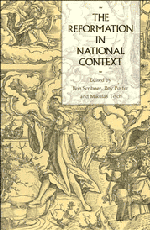6 - Scotland
Published online by Cambridge University Press: 04 December 2009
Summary
The year 1543 would have been a natural moment for the Reformation in Scotland. The death of the orthodox James V in December 1542 had brought the earl of Arran to power as regent for the infant Queen Mary: he moved rapidly towards rapprochement with an England which had rejected the pope and was willing to countenance reforming ideas. The New Testament in English was legalised in the teeth of opposition from the bishops; Arran criticised the pope and denied belief in purgatory. A treaty was negotiated with England, and with the English negotiators came the preacher George Wishart, a charismatic Zwinglian who had fled from Scotland in 1538. He and other Protestants began to preach confidently; Protestant activists led attacks on friaries.
But Arran's ‘godly fit’, as it became known, lasted less than a year. Scottish politics were deeply divided; a conservative, pro-French faction regained power, repudiated the treaty and had Wishart executed. War with England followed; several destructive English raids culminated in a catastrophic Scottish defeat at Pinkie (1547). The Scots were forced to seek French assistance: in return for sending the young queen to France, a French army arrived in 1548 and by 1550 succeeded in ejecting the English.
Obliged to collaborate with the English invaders, the Protestant party lost credibility. Its doctrines could be referred to in 1549 simply as the ‘faith and opinion of England’. Its noble leaders were reconciled or forfeited, its best preachers exiled.
- Type
- Chapter
- Information
- The Reformation in National Context , pp. 95 - 110Publisher: Cambridge University PressPrint publication year: 1994
- 3
- Cited by

